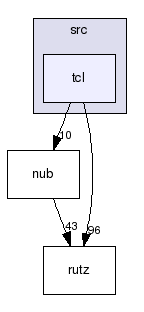

src/tcl offers a framework with which to easily create tcl wrappers around c++ code. In a tcl script application (see tcl::script_app), the program loads a series of "packages", each with its own initialization function, and then starts reading and evaluating commands from stdin. The package-initialization functions define the commands that will be understood by the script interpreter.
According to the Tcl C API, these init functions must have names like Packagename_Init(). In this c++ framework, Tcl::Pkg offers a way to quickly set up such an init function. As an example, see the definition of Dlist_Init() at the end of tcl/tclpkg-dlist.cc. Here, the macro GVX_PKG_CREATE() is used to create a Tcl::Pkg (and the macro additionally transparently creates a try/catch context, so that exceptions can be translated into error codes to be returned from the init function). Then there are a series of pkg->def() calls that bind various c++ functions to tcl commands.
For most c++ functions, this binding happens seamlessly -- as long as there are appropriate c++/tcl conversions defined for the types of the function parameters and for the function's return type. The converters for basic built-in types are defined in tcl/conversions.h, and additional converters can be defined by the user (see tcl/stdconversions.h for an example of extra converters for std::string).
Finally, src/tcl offers some c++-friendly wrappers for native tcl components. For example, tcl::list offers an interface to tcl list values, complete with c++-style iterators, and with templatized type conversions (e.g., so that you can say "give me the third value from the list, as a 'double'"). There is also tcl::interpreter, tcl::obj, tcl::dict, and tcl::regexp.
For more insight into the internals of what happens with tcl::pkg::def(), see tcl::command, tcl::commandgroup, tcl::dispatcher, and tcl::context. Basicaly, tcl::pkg::def() creates a tcl::function object using the highly templatized functions in tcl/makecmd.h. This tcl::function knows how to accept a tcl::calll_context, translate the tcl argument types into their c++ counterparts, then calls the native c++ function, then translates the c++ return value back into a tcl result. The tcl::function is used to create a tcl::command object becomes part of a tcl::commandgroup which can potentially select among overloaded tcl::command objects based on the number of arguments in a given tcl command invocation.
Here is the dynamic view: it is tcl::commandgroup that is responsible for actually registering a command with Tcl's low-level C API. When a callback comes from that API saying that the user has entered a command, control is first passed to tcl::command_group::invoke_raw(), where we first try to find a matching tcl::command overload, and then send control to tcl::command::call(). There we forward control to the tcl::dispatcher::dispatch(). In the standard case, this function will create a tcl::call_context from the array of Tcl_Obj*'s that we got from the low-level C API, and then call tcl::function::invoke() with this tcl::call_context. Remember that some templatized subclass of tcl::function is wrapping our native c++ function. If our c++ function throws an exception, it will be caught back in tcl::commandgroup::invoke_raw() and translated into an error code and error message to the tcl interpreter. If our c++ function completes successfully, then its result will be returned to the tcl interpreter via tcl::call_context::set_result().